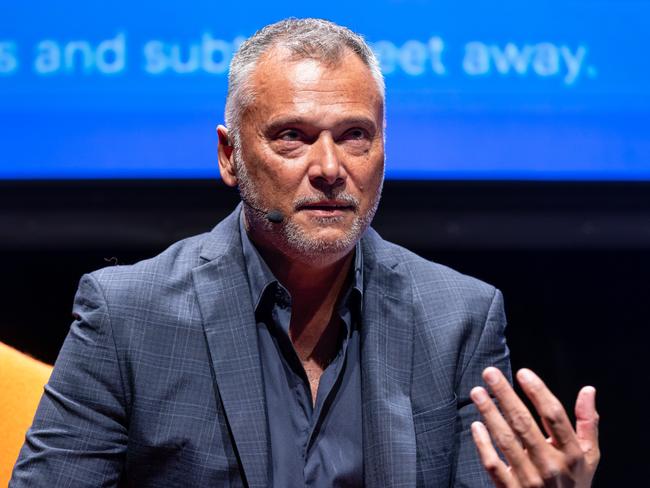James Morrow: Reconciliation is blocked by endless grievance
Kudos to journalist Stan Grant for his scoop this week revealing one of great truths of the Voice to Parliament referendum campaign, writes James Morrow.
Opinion
Don't miss out on the headlines from Opinion. Followed categories will be added to My News.
So it turns out it wasn’t a modest request after all.
Kudos to journalist Stan Grant for his scoop this week revealing one of great truths of the Voice to Parliament referendum campaign.
We now know, thanks to his speech at ANU this week (humbly titled, “The Witness of Poetry: How History is too Heavy for Democracy”), that in fact the Voice was “never a modest ask.”
Instead, said Grant, it was to be “monumental”.
It is hard to believe that just a few weeks ago, everyone from the ABC to Anthony Albanese would have called such a statement alarmist, deliberately confusing, or even “misinformation”.

If, that is, it came from the No camp. Now, though, it is received wisdom — handed down by one of the nation’s more prominent advocates for the Yes case.
Which is why Grant’s speech is important to study.
Because it indicates that while the formal vote on the referendum (and, let’s be honest, much else besides) may have been a hard “no”, the activists behind it are not giving up on their vision of an Australia eternally divided by race.
Grant, in the same manner as Noel Pearson, believes that race — or “indigeneity” — is the defining character behind the way Australians relate to one another and that how far back you can trace your ancestry determines your standing.
For Pearson, this took the form of a three-legged stool of Aboriginal Australia, Anglo-Saxon settlers and later multicultural arrivals, the lattermost of whom he famously said needed to choose whose side they were on.
Where Grant makes his big mistake, though, is in seeing the No camp’s thumping victory a rejection of the Aboriginal experience.
“Our nation is set in stone: one word, ‘No’. Whatever hope there may be for a different Australia, I likely won’t live to see it,” he told the crowd.
“This is the Australia I bequeath to my children. Like all orphans they will have their memories and however pained they may be, they can never be reconciled. My dead: black and white — my ancestors — lie restless in this land.”
Continuing the theme, Grant said the No vote was an act of “cruelty”.
“Australia has decided who we are. It has reminded me of the space between us.” For real?
Yet like the Simpsons’ Principal Skinner wondering if he is out of touch (before deciding it is the children who are wrong), Grant and so many on his side do not get that true healing does not come from endless picking over the sores of the past. Instead, it will come in trying to make things better today and in the future.
Nowhere is this seen more clearly than in Grant’s churlish sore loser gracelessness about the Indigenous woman who did so much, with Warren Mundine, to explain why the Voice was not the answer to Aboriginal disadvantage or reconciliation.
Referring presumably (if not by name) to Jacinta Nampijinpa Price, Grant complained of “the victorious politician who says this no vote puts an end to the politics of grievance”.
Yet if we pause for a moment, is it any wonder that given the choice between Price’s and Mundine’s optimistic vision for the future, and that of the likes of Grant where history is endlessly raked over, Australians chose the former?
Recall that the longer form (or “background pages”) of the Uluru Statement called for much more than reconciliation, but instead treaty and reparations including potentially a percentage of GDP, and that in the wake of the defeat an anonymous letter by Indigenous leaders sneered at “people who came to our country in only the last 235 years”.
It is also worth noting that plenty of Yes campaigners such as Thomas Mayo had in recent history made aggressive calls to “pay the rent”.
And that legal academics such as UNSW’s Gabrielle Appleby, meanwhile, were hard at work building a framework suggesting that Australia was suffering a “constitutional crisis” that could open the door to “co-sovereignty” arrangements for Aboriginal Australians.
It’s all the dreary old oppressor-oppressed narrative all over again, which is what Australians sensibly rejected a few weeks ago.
It also feeds into the broader line of thought that seeks to portray modern Australia — a success story of democracy and tolerance and prosperity if there ever was one — as nothing more than an illegitimate colonial settler state.
This line of thinking has also led to bizarre attempts to link Aboriginal and Palestinian causes that says Indigenous Australians have been here for tens of thousands of years while pretending that Jewish presence in the Middle East only goes back to 1948.
Thus for many on the left, modern democracies such as Australia and Israel are oppressors, not success stories.
Yet the true lesson — painfully underlined over the past few weeks — is that it is endless grievance that is the true barrier to reconciliation.





